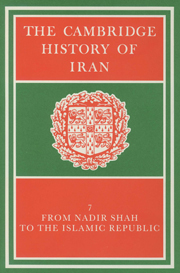Book contents
- Frontmatter
- PART 1 THE POLITICAL FRAMEWORK, 1722–1979
- PART 2 FOREIGN RELATIONS
- 8 IRANIAN RELATIONS WITH THE OTTOMAN EMPIRE IN THE EIGHTEENTH AND NINETEENTH CENTURIES
- 9 IRANIAN RELATIONS WITH RUSSIA AND THE SOVIET UNION, TO 1921
- 10 IRANIAN RELATIONS WITH THE EUROPEAN TRADING COMPANIES, TO 1798
- 11 IRANIAN RELATIONS WITH GREAT BRITAIN AND BRITISH INDIA, 1798–1921
- 12 IRANIAN FOREIGN POLICY, 1921–1979
- PART 3 ECONOMIC AND SOCIAL DEVELOPMENTS
- PART 4 RELIGIOUS AND CULTURAL LIFE, 1721–1979
- Genealogical tables
- Bibliographies
- Index
- References
11 - IRANIAN RELATIONS WITH GREAT BRITAIN AND BRITISH INDIA, 1798–1921
from PART 2 - FOREIGN RELATIONS
Published online by Cambridge University Press: 28 March 2008
- Frontmatter
- PART 1 THE POLITICAL FRAMEWORK, 1722–1979
- PART 2 FOREIGN RELATIONS
- 8 IRANIAN RELATIONS WITH THE OTTOMAN EMPIRE IN THE EIGHTEENTH AND NINETEENTH CENTURIES
- 9 IRANIAN RELATIONS WITH RUSSIA AND THE SOVIET UNION, TO 1921
- 10 IRANIAN RELATIONS WITH THE EUROPEAN TRADING COMPANIES, TO 1798
- 11 IRANIAN RELATIONS WITH GREAT BRITAIN AND BRITISH INDIA, 1798–1921
- 12 IRANIAN FOREIGN POLICY, 1921–1979
- PART 3 ECONOMIC AND SOCIAL DEVELOPMENTS
- PART 4 RELIGIOUS AND CULTURAL LIFE, 1721–1979
- Genealogical tables
- Bibliographies
- Index
- References
Summary
The European power geographically closest to Iran was Russia. Peter the Great had brought the two countries into conflict as a result of his ambitions in the Caspian and the Caucasus regions, thereby threatening Iran's northwestern provinces. Extended into Central Asia these Russian ambitions set a pattern which lasted long beyond the 18th century, although Peter's death in 1725 and Nādir Shāh's campaigns temporarily halted Russia's advance. In the distracted decades later in the century Iran's position in the Caucasus grew steadily weaker, and when it attempted to re-establish relationships as they had existed under the Safavids, Georgia sought the protection of Catherine the Great.
In 1795 the urge to recover one of the Safavid kingdom's richest provinces prompted Āghā Muhammad Khān's march into Georgia. Catherine responded by sending a Russian expedition (1796) under Count Valerian Zubov, and the Qājār Shah was again on his way to Georgia when he was murdered in 1797. The problem of the northwest frontier and Iran's relations with Russia were among the most difficult his nephew and successor, Fath ‘Alī Shāh, had to face. To obtain help in this problem was the main objective of Iranian statecraft in the complicated negotiations conducted throughout the Napoleonic period, but neither France nor Britain could provide the kind of support Iran needed.
Britain's diplomatic and strategic interest in Iran arose initially not from the perception of a Russian, but a French threat. In 1796, the Chairman of the Board of Directors of the East India Company, Stephen Lushington, was in correspondence with Henry Dundas, President of the Board of Control, regarding the French menace to India through Egypt.
- Type
- Chapter
- Information
- The Cambridge History of Iran , pp. 374 - 425Publisher: Cambridge University PressPrint publication year: 1991
References
- 6
- Cited by

